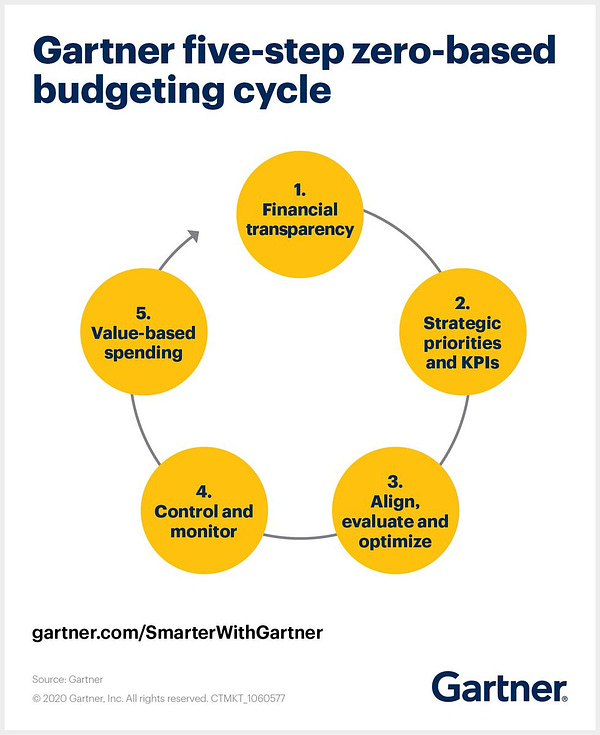Is Zero-Based Budgeting the Future?
Size Zero businesses adopt Zero Budgeting to remain agile, fit and fast
A year into the Coronavirus pandemic we are witnessing the rise of slimmer, smarter businesses that operate in new ways, taking advantage of new collaborative technologies and a globally available resource base. We call them Size Zero businesses.
These organisations are ‘just big enough’, highly focused on delivering value and use data to drive insights and innovation. They share a new mindset and belief that growth is not measured by the number of employees or customers you have, but the value you create.
Size Zero means operating at maximum efficiency by focusing on where value is created, and being ruthless in removing waste. Doing more, with less if you like.
Size Zero businesses, amongst other key principles, adopt Zero Budgets.


You would think that anyone working for a company with ‘Texas’ in its name would be conditioned to think big. But when it came to budgeting, Texas Instruments manager Peter Pyhrr did the opposite. He thought zero. “Each year he prepared his budgets as if last year's figures had not existed,” recounts The Economist. “Every assumption had to be rethought from scratch and then justified.”
This was back in the 1960’s.
Pyhrr described his process in a 1973 book called Zero-based Budgeting: A Practical Management Tool for Evaluating Expenses.
There was brief interest in the method, with Jimmy Carter even going so far as to propose it as a way of cutting US federal budgets in his 1976 presidential campaign.
But in those days before office computers many people were put off by the large numbers of calculations involved.
Fast-forward four decades and computing is no problem. On the other hand, ‘budget bloat’ is. Basing next years expenditure on what you spent this year is not exactly an efficient way of controlling costs. In particular, sales, general and administrative costs have a habit of growing year on year until they start to outpace growth in revenues.
So, for companies seeking a smarter, sleeker, Size Zero way of doing business, Pyhrr’s zero-based budgeting is back in fashion.
Investopedia defines zero-based budgeting as: “A method of budgeting in which all expenses must be justified for each new period” and notes that it “can lower costs by avoiding blanket increases or decreases to a prior period’s budget.”
McKinsey tells of a company that saved 11% of its operating budget within four months of introducing zero-based budgeting. The company reinvested 40% of the savings back into customer-facing staff.
More generally, McKinsey says zero-based budgeting can typically lop between 10% and 25% off sales, general and administrative costs, “often within as little as six months.” But the approach can be applied to just about anything - any project, department or function, with minor adjustments.
The consultancy also demolished some common myths that have grown up around zero-based budgeting. It's not simply a way of building budgets from zero, for example: it’s a repeatable process that can create a sustainable culture of cost management.
Nor does it always imply doing away with all costs. In reality, the degree of cost reduction can be set by the company strategy and so is up to the requirements of the business in a given point in time.
Nobody argues that zero-based budgeting is less onerous than simply rolling an existing budget from one year to another. But in practice, it can be achieved by a central team, led by finance and IT, in four to ten months.
US cereal-to-snacks group Kellog recently implemented zero-based budgeting. In the first two years ending in 2018 they achieved savings of over $450 million in their North American and international business.
Zero Budget businesses do it to become leaner, faster and more agile. They reinvest a proportion of the cost savings to drive closer customer interactions and product innovations - so staying ahead of the competition. This could prove critical as we manage our way through the post-pandemic, economically challenged period.
And, as new consumer habits are establishing themselves following this once in a generation adjustment, we need to be closer to them and faster to market with new innovations than before.
Some people believe that zero-based budgeting is not intended for companies that are growing aggressively. This too is false. In fact, it’s a good way to cut out unproductive costs so money can be spent in more useful areas.
If zero-based budgeting sounds like a lot of work, then it's worth remembering that it is basically for people who are really serious about creating value and making more money.
Accenture Strategy conducted a research on zero-based thinking involving 85 biggest global companies across industries from banking and retail to CPG and life sciences. Their research found that this approach has helped firms drastically optimize costs and bring saving to the bottom line. The average cost reduction was 15-18% across sales general administrative expenses, employee costs and costs of goods sold. 35% of these savings are realized from reduced supplier prices, while 65% from reduced consumption/wastage avoidance.
A few years ago, when 3G teamed up with Warren Buffett’s Berkshire Hathaway to buy Heinz, the ketchup maker was taken back to basics in a Zero-Budgeting exercise aimed at saving $150 million. They had already applied the approach to their acquisition of Burger King, where they tripled the fast-food chain’s profit margin, to 61%.
Zero Budget businesses may prove to be the future - particularly if the approach can get baked into processes and systems. But the prospect of creating a more agile, innovative and profitable business should be reason enough in these challenging times.
Subscribe to Surviving to join the conversation via comments, Q&A sessions and more - its free! And follow us on twitter @LettsGroup.



